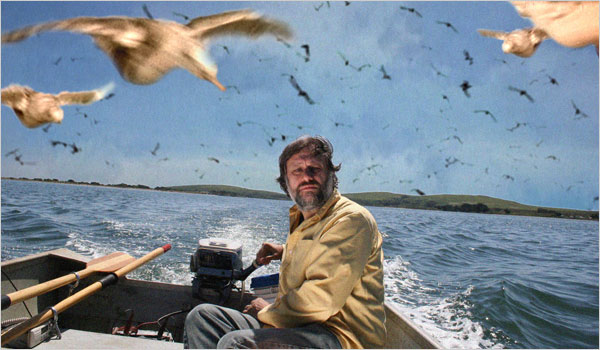|
Reviews of Recent Independent, Foreign, & Documentary Films in Theaters and DVD/Home Video

THE PERVERT’S GUIDE TO CINEMA
Yet one shouldn't go into seeing this thinking Zizek will just dissect all of the psycho-sexual references in an obtuse, deranged manner. If anything, he opens one up to a line of reasoning that might never have been considered otherwise. Who else would think of the Marx brothers as representations of the id, super-ego, and ego aside from Zizek? He's not just one to take on the classics: he also considers the impressive food for thought in The Matrix and Fight Club. He even throws in the pivotal moment in Star Wars: Episode III–Revenge of the Sith when Anakin becomes Darth Vader. His take here on the implications involved with immortality and fatherhood, as well as the male point of view in turning fantasy into reality, are dead-on. (Zizek rightfully refers to Vertigo.) He deconstructs a pivotal scene from Blue Velvet involving three colliding points of view as if were the Zapruder film. Now it would be one thing if Zizek himself went about making these sincere, excited, and somehow plausible points by just facing the camera or mostly through voice-over as Scorsese does. But he takes a step further to accentuate his arguments of fantasy and reality, and how they overlap, intersect, become one and the same, or spread off into some netherworld (i.e. Lost Highway). He puts himself in the locations the films take place in. These scenes end up being very funny; funniest of all is first seeing him in the boat heading towards the same dock as Tippi Hedren at the beginning of The Birds. Equally uproarious, Zizek waters the lawn a la Blue Velvet and explains the multi-faceted points of Dennis Hopper’s character Frank Booth. Only once, when he's in Solaris-like territory to explain Tarkovsky’s masterpiece, does it seem a little cheesy. While there were some films I would've expected, chiefly from Hitchcock and Lynch, a treat for movie buffs comes from seeing pictures one would never think of seeing in a film about films called The Pervert's Guide of Cinema. The top two for me are a 1930’s Disney cartoon, “Pluto’s Judgment Day,” and The Great Dictator. And the ones that I haven’t seen yet (like Fritz Lang’s The Testament of Dr. Mabuse) inspire immediate feelings of “Wow, I have to see that, no questions asked.” Zizek is a powerful writer, and he puts
forward with clarity why we watch movies in the first place—to be
entertained but also to have that actual experience of sitting down and,
as he puts it, “looking into a toilet,” like in The Conversation.
This is probably one of the greatest films about cinema, with a
splendidly narrow analysis of how Freud’s theories work
their way into movies, which tell us not what to desire, but how
to desire. Jack Gattanella
|

